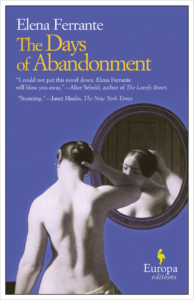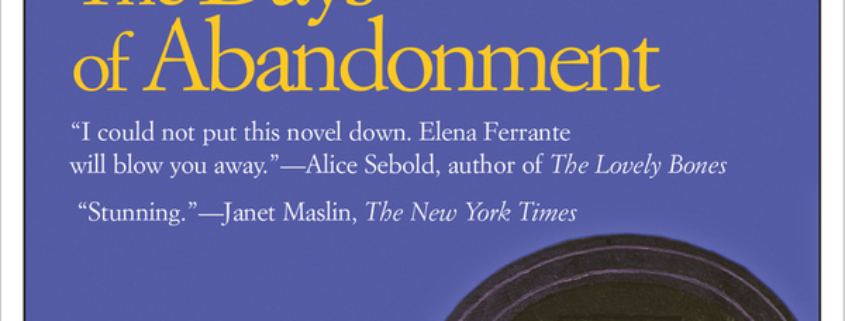Writers Read: The Days of Abandonment by Elena Ferrante
 Elena Ferrante’s The Days of Abandonment explores a woman trying to survive the emotional storm after her husband leaves her. While thin on plot, the specificity of the character study strikes a universal chord. The brutal and ugly honesty is striking, off-putting, and at times self-indulgent, but the character always remains true, which makes her human. Ferrante’s style lacks romance and is confrontational as she creates a complicated three-dimensional female character. Keeping the cultish devotion of Ferrante’s readers in mind, the character of Olga has a tradition in Joan Didion’s Maria in Play it As It Lays and even further back to Virginia Woolf’s Mrs. Dalloway, both committed to portraying women as they are instead of as they are supposed to be.
Elena Ferrante’s The Days of Abandonment explores a woman trying to survive the emotional storm after her husband leaves her. While thin on plot, the specificity of the character study strikes a universal chord. The brutal and ugly honesty is striking, off-putting, and at times self-indulgent, but the character always remains true, which makes her human. Ferrante’s style lacks romance and is confrontational as she creates a complicated three-dimensional female character. Keeping the cultish devotion of Ferrante’s readers in mind, the character of Olga has a tradition in Joan Didion’s Maria in Play it As It Lays and even further back to Virginia Woolf’s Mrs. Dalloway, both committed to portraying women as they are instead of as they are supposed to be.
Although Ferrante does not create a style that feels like it could be branded as “Ferrante” in the way that Didion and Woolf do, she is relentless in stripping away her character’s artifice until, in the end, she cracks Olga down to her core in order to rebuild her. The language used to express the darkest of Olga’s emotions is unapologetic. Like Didion and Woolf, Ferrante is most concerned with naming those parts that are supposed to be suppressed, ignored, or denied. There is a lack of sympathy for Olga, allowing the reader to feel anger and frustration toward her while remaining compelled to watch and see if she emerges from the brink of the abyss. Ferrante resists the urge to give Olga any slack and instead delves deeper into the darkness of marriage, motherhood, and self, which are taught at a young age to women. It is this element that frames Ferrante’s Olga in a different light than Didion’s Maria and Woolf’s Mrs. Dalloway.
Keeping the cultish devotion of Ferrante’s readers in mind, the character of Olga has a tradition in Joan Didion’s Maria in Play it As It Lays and even further back to Virginia Woolf’s Mrs. Dalloway, both committed to portraying women as they are instead of as they are supposed to be.

Elena Ferrante’s translator, Ann Goldstein.
Although the ghostlike images in Olga’s mind allow the reader to gain insight into Olga’s background, they also give a sense of the generational construction of her character prior to the abandonment. While the story remains in the presents, these devices allow the reader a glimpse of the past. The flashbacks are organically triggered during Olga’s descent in the form of a headache or dizziness. Again Ferrante refuses to indulge in any romanticism of those visions. They are concise and exist on the back burner of the narrative, never at odds with the primary narrative, and barely constituting an independent thread. The flashes are used economically to create context, making Olga less a product of the times in which she lives (Maria and Mrs. Dalloway certainly feel like products of their time) and more a product of inheritance and learned behavior. Perhaps, her husband’s affair and the dissolution of their marriage was an inevitability, but putting it in the context of Olga’s own history eventually creates accountability, which allows her to make choices that are solely her own.
Ferrante’s writing wastes no time; the inciting incident occurs with the first sentence. The character’s internal unraveling mirrors her external world and they move at the same rate. As Olga becomes unhinged, so do her actual circumstances until she is finally trapped in the house with a sick dog and sick child. It’s a frustrating and, at times, ridiculous sequence to read, but it ultimately feels like a metaphor playing out in reality. It is both Olga’s bottoming out and resurgence. There is a tightness or control to the writing in the beginning that becomes more frenetic and chaotic as Olga’s reality begins to sink in and she reacts against it: the reality that she is trapped by the life she was living with her husband, but unlike him, she cannot simply walk out. It is the universality of this dilemma and the relentless honesty to the female point of view that takes center stage, becoming bigger than plot itself or the typical expectations of female characters.
 Roz Weisberg is completing MFA in Fiction at Antioch University and was YA Editor for Lunch Ticket. She serves as a mentor to teen girls at WriteGirl and mentors aspiring screenwriters at the Cinestory Foundation Retreat in Idllywyld, CA. When not developing stories, consuming pop culture, or searching for the perfect chocolate chip, she awaits March Madness and the underdog Cinderella Team that will inevitably break her heart.
Roz Weisberg is completing MFA in Fiction at Antioch University and was YA Editor for Lunch Ticket. She serves as a mentor to teen girls at WriteGirl and mentors aspiring screenwriters at the Cinestory Foundation Retreat in Idllywyld, CA. When not developing stories, consuming pop culture, or searching for the perfect chocolate chip, she awaits March Madness and the underdog Cinderella Team that will inevitably break her heart.





